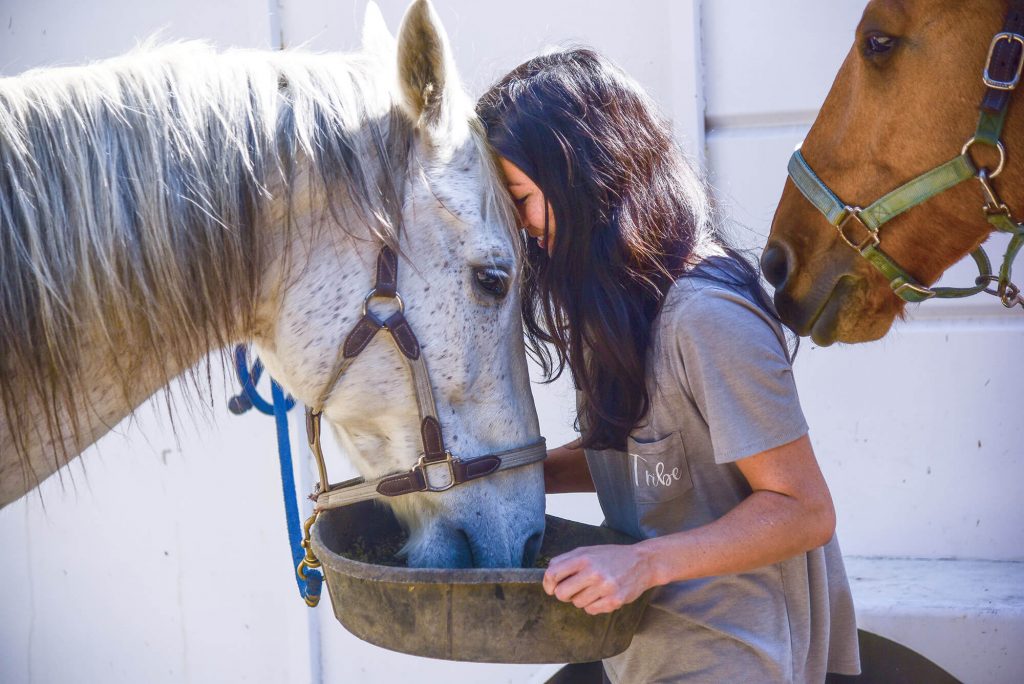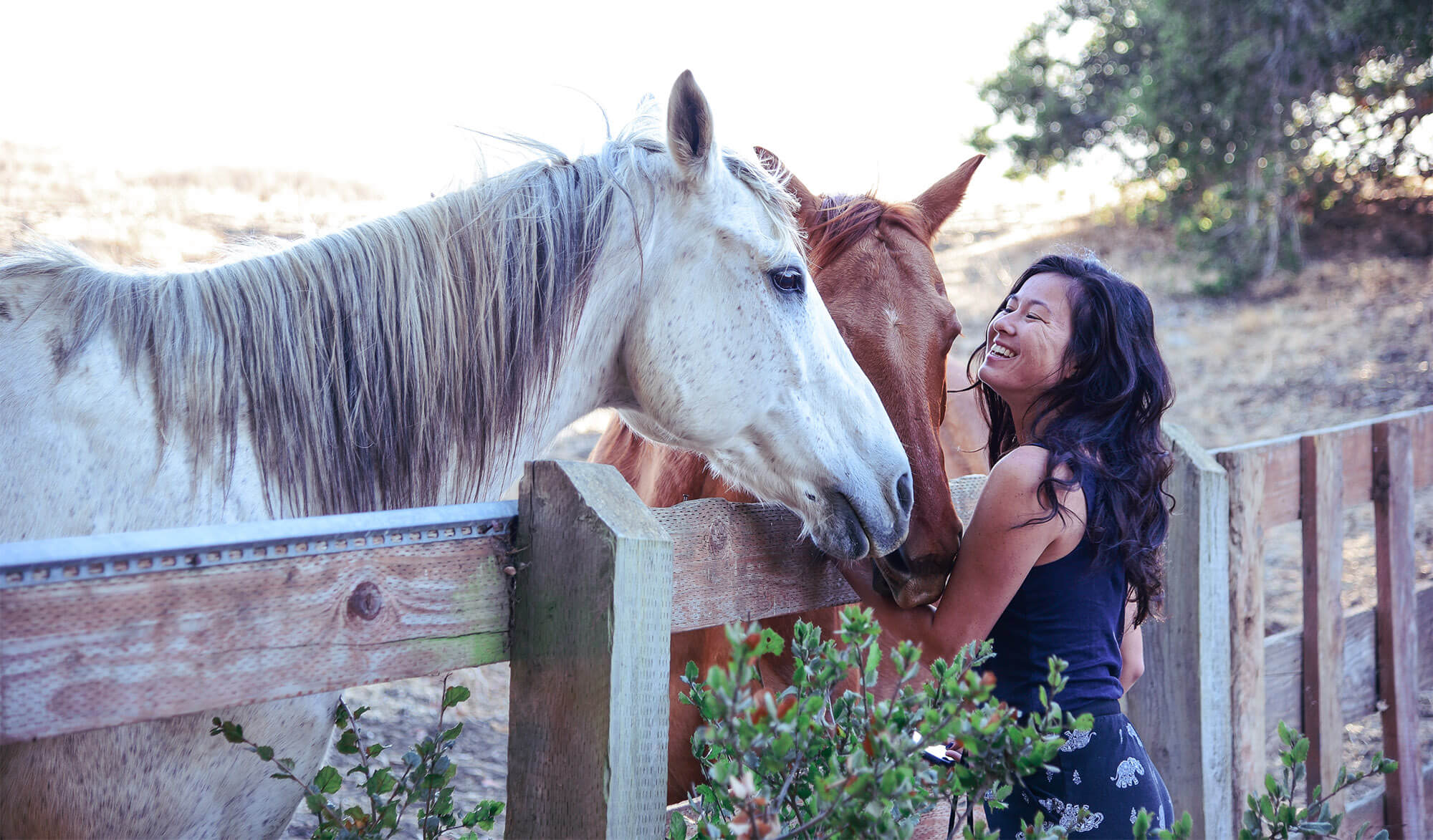Looking for a horse that comes to the gate when they see you? One who follows you happily to the barn, who shows you affection? Not every new horse starts off this way, as it completely depends on their past experiences. And sometimes, even when they come to us this way, horse owners end up with a sour horse who stops choosing to be with them. If you want to change how your horse views you, but you don’t know where to start, this post is for you!
Strengthening the “Bond”
So many people seek ways to strengthen their bond with their horse. I always wonder, what exactly do they mean by the bond? Our horses are bound to us legally by ownership, or a lease. Horses rely on us for food, shelter, hygiene and health – which binds them to us, in a way. But when someone sees a horse & human pair and envies their bond, they are admiring something beyond any of these basic needs. They are usually witnessing a horse looking like it is magnetized to the human.
If you are wishing for a beautiful bond with your horse, I encourage you to think more deeply about your goal. What you likely seek is a more positive relationship with your horse. You might want your horse to enjoy spending time with you, and show you affection to prove that they enjoy your time together. Or you might want your horse to become more willing to perform for you, and for them to demonstrate a happier attitude when training. I will be focusing on the first one!
The First Question: What Does Your Horse Like?
Before you can become someone your horse finds enjoyable, you’ll need to have a basic understanding of what your horse enjoys. Horses can find enjoyment from companionship, grooming, food, physical and mental stimulation. Every horse has these activities ranked differently, and the ranking can change over their lifetime, and even throughout a day. For example, typically my horses look like this:
Tucker: Physical challenge > Mental stimulation > Companionship > Food > Grooming
Trubee: Food > Companionship > Grooming > Mental stimulation > Physical challenge
But depending on when they last ate, food might be ranked higher for Tucker. If Trubee is feeling particularly good, he actually thrives with physical challenges. If you want your horse to learn to enjoy being with you, you will need to be able to read their mental state at any given time to best appeal to how they are feeling at that time. After your horse feels safe with you, food & mental stimulation together is usually a great place to start!

How to Begin
If you have a new horse, or have moved your horse to a new location and find them to be suddenly distant from you, I always recommend beginning with doing nothing together. If you can sit with them while they eat, that is a wonderful place to start. Grooming while they are in their home is also a great thing to do, if they are willing for you to stand with them and it is safe to do so (if they are with a pushy herd, this might be a dangerous thing to try). The goal is to spend time with them in an environment where they are calm and comfortable. If you only remove them from where they feel safe, then you become associated with stress and discomfort. If your horse is living in a group pasture setting, you can try removing them from pasture and feeding them or grooming them just outside the fence-line. Remember that horses are herd creatures – there is absolutely nothing you can do to change that! But you can fuel their confidence to allow your horse to function outside of the herd, and to trust you as a type of herd.
Clicker Training / Trick Training
Whether your horse is burnt out from training, or uncertain of you as a new human in their life, presenting them with something new and fun can do wonders for their outlook on life. I find that trick training serves perfectly for this purpose. Most horses love food, and mental stimulation awakens the soul 😉
I think clicker training has many additional benefits when used for trick training. The nature of clicker training is clarity, which makes it easier to bridge the communication gap between horse & human. Horses work hard to understand us strange humans, it is the least we can do to offer a language that is clear and easy to understand! Horses and humans alike are happier when they understand how to achieve success, and become frustrated and shut down when continuously confused. By offering easy to figure out puzzles, and rewarding success, you might find your horse opening up and see them start to seek out the “correct” answers.
Easy tricks to try:
Building on Success
If you find your horse lights up from trick training, then you can get creative and continue teaching more fun and exciting tricks. Tricks can be turned into games, too! Things like target training can be incorporated into just about anything, helping to give your horse confidence in scary places such as trailers or wash racks. If this isn’t quite your horse’s cup of tea, you can turn to groundwork utilizing obstacles to keep things interesting. The clicker is useful for telling your horse when they do the “right” thing in any setting 🙂
Most horses benefit from mixing up the activities that you do with them, though nervous horses can benefit from comfortable routines as a foundation to build on too. Every horse and every situation is different, so be sure NOT to compare your relationship with your horse to anyone else’s!

